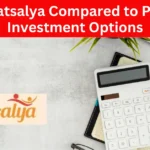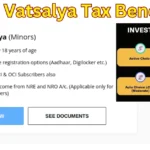PPF Vs, NPS VATSALYA: Government constantly strives to empower its citizens with robust financial tools, especially for securing the future of the younger generation. With the introduction of the NPS Vatsalya scheme in Budget 2024-25, parents now have another avenue for building a secure financial foundation for their children. This new entrant joins the ranks of the well-established Public Provident Fund (PPF), prompting many to question which path to choose. This article delves into a detailed comparison of PPF vs. NPS Vatsalya, equipping you with the knowledge to make an informed decision for your child’s financial well-being.
Understanding the Basics: PPF vs. NPS Vatsalya
| Feature | PPF | NPS Vatsalya |
|---|---|---|
| Nature | Government-backed savings scheme | Government-backed pension scheme |
| Objective | Long-term savings and wealth creation | Retirement planning for minors |
| Eligibility | Indian citizens | Minors (account opened by parents/guardians) |
| Investment Limit | ₹1.5 lakhs per financial year | To be determined (as of Budget 2024-25 announcement) |
| Lock-in Period | 15 years (with partial withdrawal options) | Till the child turns 18 (then converts to regular NPS) |
| Returns | Fixed interest rate, revised quarterly | Market-linked returns (equity and debt exposure) |
| Tax Benefits | EEE (Exempt-Exempt-Exempt) | EET (Exempt-Exempt-Taxed) |
Public Provident Fund (PPF): A Deep Dive
Guaranteed Returns: A key attraction of PPF is its guaranteed returns. The interest rate, while subject to quarterly revisions, offers stability and predictability that’s particularly appealing in volatile market conditions.
Tax Efficiency: PPF enjoys the coveted EEE status, meaning your contributions, accumulated interest, and final withdrawal are all tax-free. This makes it a highly tax-efficient investment option.
Loan Facility: PPF allows you to avail of loans against your investment, providing liquidity in times of financial need.
Who Can Benefit from PPF?
- Risk-averse investors: If you prioritize capital protection and prefer predictable returns over market-linked fluctuations, PPF is a suitable option.
- Long-term financial goals: Whether saving for your child’s education, marriage, or your own retirement, PPF’s long-term horizon aligns well with such objectives.
National Pension System (NPS): Exploring the Vatsalya Scheme
Understanding NPS Vatsalya
Dedicated to Minors: This scheme is specifically designed to initiate retirement planning for minors, allowing parents/guardians to contribute towards a financially secure future for their children.
Seamless Transition: Upon the child reaching the age of majority (18 years), the Vatsalya account seamlessly transitions into a regular NPS account, ensuring continuity in retirement planning.
Potential for Higher Returns: Unlike PPF’s fixed returns, NPS offers market-linked returns through investments in equity and debt instruments. While this carries higher risk, it also presents the potential for higher returns over the long term.
Who Should Consider NPS Vatsalya?
- Parents seeking early retirement planning: Starting early with NPS Vatsalya allows for a longer investment horizon, potentially maximizing returns through the power of compounding.
- Individuals comfortable with moderate risk: If you’re open to market-linked investments and aim for potentially higher returns than PPF, NPS Vatsalya could be a suitable option.
Try This: NPS Vatsalya Calculator
PPF vs. NPS Vatsalya: A Head-to-Head Comparison
Returns and Risk:
- PPF: Offers guaranteed, low-risk returns, making it ideal for risk-averse investors.
- NPS Vatsalya: Potentially higher returns due to market-linked investments, but comes with moderate risk.
Liquidity:
- PPF: Offers limited liquidity with partial withdrawal and loan facilities.
- NPS Vatsalya: Funds are locked in till the child turns 18, offering no liquidity before that.
Tax Implications:
- PPF: Enjoys EEE status, making it highly tax-efficient.
- NPS Vatsalya: Offers EET status, with tax implications on maturity.
Making the Choice: Which One is Right for You?
Consider Your Risk Appetite:
- Low-risk tolerance: PPF’s guaranteed returns provide peace of mind.
- Moderate risk tolerance: NPS Vatsalya’s market-linked returns might be appealing.
Evaluate Your Investment Horizon:
- Shorter term: PPF’s 15-year lock-in might suit short-to-medium term goals.
- Long term: NPS Vatsalya, with its focus on retirement, aligns with long-term objectives.
Factor in Tax Planning:
- Maximize tax benefits: PPF’s EEE status provides comprehensive tax advantages.
- Balance tax efficiency with potential returns: NPS Vatsalya, while having tax implications on maturity, could offer higher returns.
FAQs: Addressing Your Queries
Can I open both PPF and NPS Vatsalya accounts for my child?
Yes, you can have both accounts to diversify your child’s investment portfolio.
What happens to the NPS Vatsalya account if the parent/guardian passes away?
The account remains active, and contributions can be continued by a designated nominee.
Can I withdraw money from my child’s NPS Vatsalya account for emergencies?
No, premature withdrawals are not allowed before the child turns 18.
What are the tax benefits of contributing to NPS Vatsalya?
You can avail of tax deductions on contributions under Section 80C of the Income Tax Act.
Is there a minimum contribution requirement for NPS Vatsalya?
The minimum contribution details are yet to be announced.
Can I transfer my existing NPS account to my child’s NPS Vatsalya account?
No, account transfers between different types of NPS accounts are not permitted.
Read More: New Pension Scheme ‘NPS Vatsalya’ Launched for Minors: A Future Investment Opportunity
PPF vs. NPS VATSALYA
Choosing between PPF and NPS Vatsalya is a crucial decision that requires careful consideration of your financial goals, risk tolerance, and investment horizon. Both offer distinct advantages, and the “better” option depends on your individual circumstances. By understanding the nuances of each scheme, you can make an informed choice that best secures your child’s financial future. Remember to consult with a certified financial advisor for personalized guidance tailored to your specific needs and circumstances.










